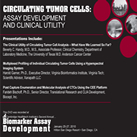CONFERENCE SERIES: Biomarkers & Diagnostics
Recorded at: Biomarker Assay Development

 Digital Course: Circulating Tumor Cells: Assay Development and Clinical Utility
Digital Course: Circulating Tumor Cells: Assay Development and Clinical Utility
Circulating Tumor Cells (CTCs) have recently captured the spotlight because of their potential as prognostic markers for clinical management of cancer patients. Translation of CTC technologies into clinical practice requires progress in assay development and establishing clinical utility. This digital course features expert speakers from CHI’s Biomarker Assay Development 2010 meeting addressing novel approaches to CTC detection and profiling, as well as establishing clinical utility of CTCs for predicting disease progression and response to therapy.
Preview
Presentations Include:
The Clinical Utility of Circulating Tumor Cell Analysis – What Have We Learned So Far?
 Beverly C. Handy, M.D., M.S., Associate Professor, Clinical Chemistry, Department of Laboratory Medicine, The University of Texas M.D. Anderson Cancer Center
Beverly C. Handy, M.D., M.S., Associate Professor, Clinical Chemistry, Department of Laboratory Medicine, The University of Texas M.D. Anderson Cancer Center
Metastatic cancers, even when of the same tissue type, show considerable variability in their clinical behavior. Prognostic indicators that are of proven value in predicting disease aggressiveness and response to therapy are therefore, extremely useful aides for optimizing individual treatment planning. Among these, a growing body of literature indicates that the enumeration of circulating tumor cells (CTC) from peripheral blood can serve as an independent prognostic marker for clinically managing patients with some types of metastatic cancers. In particular, the level of CTC has been shown to be predictive of survival in breast, colorectal, and prostate metastatic disease. It is likely that it will be useful in tumors of other organs as well. Additional potential applications include evaluation of treatment response and use in disease staging. Isolation of CTC also offer potential opportunities for further analysis and molecular characterization of these cells, which may allow further optimization of treatment.
Biography:
A pathologist, she specializes in the area of clinical chemistry, and has particular research interests in the study of serum tumor markers and monoclonal gammopathies.
Multiplexed Profiling of Individual Circulating Tumor Cells using a Hyperspectral Imaging System
 Harold R. “Skip” Garner, Ph.D., Executive Director, Virginia Bioinformatics Institute, Virginia Tech; Scientific Advisor, Xanapath LLC
Harold R. “Skip” Garner, Ph.D., Executive Director, Virginia Bioinformatics Institute, Virginia Tech; Scientific Advisor, Xanapath LLC
A new hyperspectral microscope imaging system, named the Intelligent Single Cell Optical Profiling Engine (“I-SCOPE”), is capable of analyzing tumor marker expression levels in individual, intact cells. The system quantifies multiplexed cocktails of engineered fluorophores conjugated to up to 13 markers. Results from analyses of tumor cells in a variety of specimen types will be reviewed.
Biography:
Skip received his B.S. in Nuclear Engineering at the University of Missouri – Rolla in 1976 and a Ph.D. in plasma/high temperature matter physics from the University of Wisconsin, Madison in 1982. Skip currently holds the P. O’B. Montgomery, M.D., Distinguished Chair, is a Professor of Biochemistry and Internal Medicine. His lab focuses on research in three areas: 1) applied computational biology, 2) advanced instrumentation development and 3) genetics, genomics and proteomics research (http://innovation.swmed.edu). He is the founder of several startup companies and sits on numerous corporate advisory boards and advises for numerous governmental agencies.
Post Capture Enumeration and Molecular Analysis of CTCs using the CEE Platform
 Farideh Bischoff, Ph.D., Senior Director, Translational Research and CLIA Development, Biocept, Inc.
Farideh Bischoff, Ph.D., Senior Director, Translational Research and CLIA Development, Biocept, Inc.
The Biocept CEE (Cell Capture and Extraction) device consists of micro-channels designed to selectively capture and enrich target rare cells, including CTCs from blood. Because the Biocept CEE device is attached to the surface of a glass slide, the system is particularly suited for direct and immediate single CTC morphologic assessment, in addition to immunochemical and genetic analysis. The processing of blood samples from advanced stage cancer patients, including breast, prostate and lung, have been optimized for CTC capture, enumeration and post capture analysis of protein levels (IHC) as well as chromosomal/DNA content within Biocept’s CLIA laboratory, which is accredited for diagnostic testing.
Biography:
Prior to joining Biocept, Dr. Bischoff was a full-time faculty member in the Department of Obstetrics/Gynecology at Baylor College of Medicine from 1994 to 2007. An expert in clinical and molecular human cytogenetics, she has conducted research in non-invasive prenatal genetic testing and more recently cancer screening and surveillance. For more than 14 years, Dr. Bischoff has been a key investigator in the multi-center NIH/NICHD funded study focused on establishment of protocols and investigations into the clinical utility of circulating rare fetal cells. Dr. Bischoff has published over 100 peer-reviewed papers and book chapters. She holds a Ph.D. in Cancer Biology from University of Texas Graduate School for Biomedical Sciences in Houston, Texas, with postdoctoral training at M.D. Anderson Cancer Center.
About this Product:
3 Presentations
Over 74 Slides
81 Minutes
Individual Copy: $295
Site License: $995